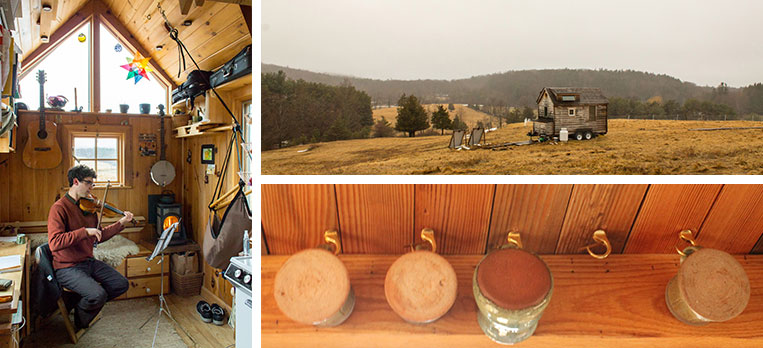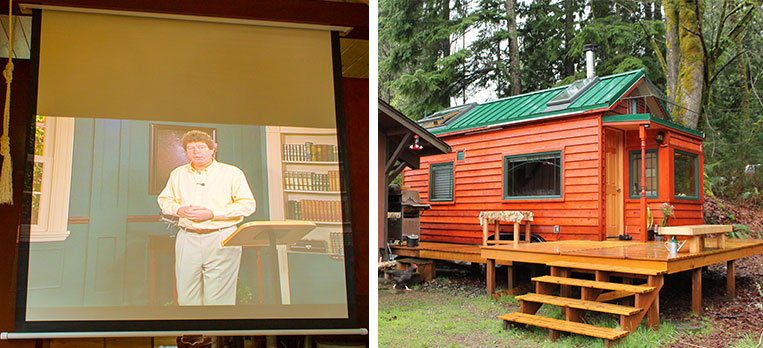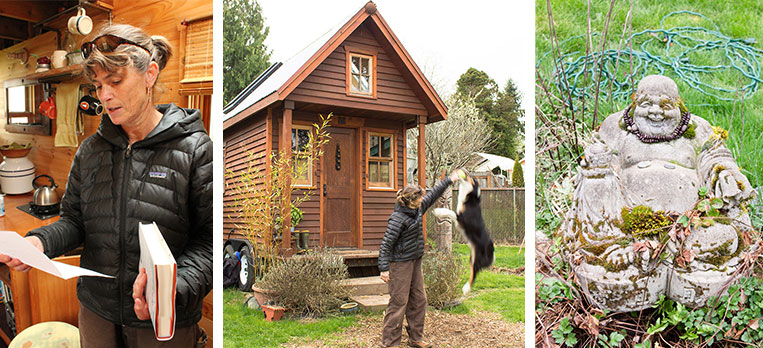
By Billy Ulmer, author of the Life in a Tiny House Ebook.
The ranks of tiny home builders are growing rapidly, so it’s easier now than ever to buy a tiny house instead of building one yourself. This is great, because not everyone has to, or should, build a tiny home themselves – just as not everyone has to grow all their own food, sew their own clothes or fix their own car. We develop areas of expertise so we can do things better and faster for others than they could for themselves. But is there value in doing it yourself when having it done for you is a viable option?
Yesterday I was reminded of one of the many things I learned from my tiny house interviews that had implications far beyond houses and home. While many of us live in a culture that makes it easier than ever to HAVE things, there’s still no substitute for DOING things. Creating something with your mind or your hands makes you curious, engaged and confident in your abilities in ways that can be just what the doctor ordered…even when you could order the same thing on Amazon.com for cheap.
Creating a Can-Do Attitude

For Christmas I asked for Michael Pollan’s most recent book, “Cooked”. It chronicles Pollan’s journey of learning to bake bread, fire up a barbecue and ferment his own pickles. On the jacket was a question Pollan had asked himself:
“How can people living in a highly specialized consumer economy reduce their sense of dependence and achieve a greater degree of self-sufficiency?”
For Pollan, the answer was cooking, which he finds valuable and fun despite the prevailing notion that, “While we’re home, production is work best done by someone else, and that the only legitimate form of leisure is consumption.” For me, it brought to mind that the tiny home owners I interviewed had all actively participated in the design and construction of their homes, even though many had no professional experience in those areas. To some, the idea of building a tiny house is shocking because the house is so small, but the size was never an issue to me. I was just shocked at how many people wanted to tackle the challenge of building a house. Yet they did, and they even liked it! Why?
One of the things that surprised me while working on my Life in a Tiny House Ebook was that the people I interviewed didn’t just succeed at building their own homes, they enjoyed the process – those who had architectural backgrounds or building backgrounds, and even those who had no technical experience at all. No one I spoke with said anything like, “I hated building the house, actually, but now I’m real glad I have it.” So what did they think of this new, full-time hobby they had delved into?
Aldo had a little construction experience, but nothing like building a house. He actively looked forward to taking on the challenge of building a tiny home, citing Mihaly Csikszentmihalyi’s book “Flow”: “One of the central concepts of that book is that human beings are happiest when they’re using all of their abilities, and they’re pushing themselves to develop new abilities. I had some building experience, and I knew it would push that, and I’d have to grow. So I was like, ‘Wow, that would be fun.'”

Candice didn’t have any building experience, but enjoyed her do it yourself project so much that she took on other building projects after her little house was finished:
“I was afraid when it’s done: the fun is done, the project’s over… After I built this house, my daydream is to build something. I built the chicken coop. A lot of people have backyard chickens, so I’m designing a two chicken coop. It’s satisfying my desire – I just need to build something.”
Dee Williams liked building her little house partly to distract her from some scary stuff happening in her life. Deeply engaging in a project was a great way to feel focused and accomplished even while life’s biggest issues like mortality remained out of our control. I asked Dee why so many of her stories involved helping people with construction or fix-it jobs, and she explained the allure of a challenging project to her:

“Part of it is hanging out – I’m fixing this thing while my friends are talking. Part of it is me not really being clear about what I’m doing, so it’s a challenge. I really do feel like a lot of what I spend my time doing, as far as construction or salvaging wood out of a pile, is not always knowing what I’m doing, and that’s very exhilarating. I love junk day. It’s like, I wonder if I can fix this. Then it could be used again. Which makes you kind of like a grand national champion. Even babysitting, for me – I don’t know what I’m doing. It’s like a giant experiment. I go over to hang out with a four year old, and I’m never really sure what’s going to happen.”
Active Experiences, and Passive Entertainment
I think my interviewees enjoyed creating their homes partly because building even a tiny house is a huge project, so if you don’t enjoy the process, you might not make it to the finish line. But I think it’s something else, too – the same reason Michael Pollan found value in cooking beyond just a tasty meal. Having active hobbies and experiences – just doing something – requires learning new skills, testing them, failing a few times, succeeding a little, and then learning even more. It’s hard and great in a way that passive entertainment like watching movies or sports never is, no matter how well-crafted or well-played.
Listening to the greatest album ever written can still pale in comparison with actually playing an instrument, even when you’re bad at it. Trust me, I’m joyfully bad at a number of instruments. It’s a totally different experience, because it IS an experience. It’s something you participate in, instead of just sit through. It teaches you that construction, cooking, and music aren’t just things professionals do – you can do them too. You won’t be as skilled or fast as a professional, but that isn’t necessarily the point. The point is that the world is more interesting when you really engage with it.

Construction isn’t for everyone – I hadn’t liked it nearly as much as the people I interviewed – but pursuing challenging activities that you enjoy can open a door to fun and satisfaction that inspires you to do even more. If you can engage as a hobbyist at one thing, why not another, and another? They can be as small as making homemade ice cream, or creating this “nut gallery” as a gift for a friend – real things I did this year that made me happier than 90% of the TV and movies I saw. Or they can be big activities that change the structure of your life, like building a tiny house.
That’s why I think there’s value in doing something yourself, even when you can find someone else to do it for you. In 2015, I wish you joyful persistence with whatever challenges you choose to bite off for yourself. Whether it’s building a tiny home like Dee Williams, baking bread from scratch like Michael Pollan, or completing the silly craft project you thought up like me. No matter what you do, there’s a good chance it will mean more to you than something you bought, saw or heard. Perhaps, as Dee put it, you’ll feel like a “Grand National Champion.” And who knows what it will make you feel empowered to do next?

Comments are closed.